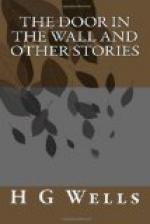He was panic-stricken. He ran furiously to and fro, dodging when there was no need to dodge, and, in his anxiety to see on every side of him at once, stumbling. For a moment he was down and they heard his fall. Far away in the circumferential wall a little doorway looked like Heaven, and he set off in a wild rush for it. He did not even look round at his pursuers until it was gained, and he had stumbled across the bridge, clambered a little way among the rocks, to the surprise and dismay of a young llama, who went leaping out of sight, and lay down sobbing for breath.
And so his coup d’etat came to an end.
He stayed outside the wall of the valley of the blind for two nights and days without food or shelter, and meditated upon the Unexpected. During these meditations he repeated very frequently and always with a profounder note of derision the exploded proverb: “In the Country of the Blind the One-Eyed Man is King.” He thought chiefly of ways of fighting and conquering these people, and it grew clear that for him no practicable way was possible. He had no weapons, and now it would be hard to get one.
The canker of civilisation had got to him even in Bogota, and he could not find it in himself to go down and assassinate a blind man. Of course, if he did that, he might then dictate terms on the threat of assassinating them all. But—Sooner or later he must sleep! . . . .
He tried also to find food among the pine trees, to be comfortable under pine boughs while the frost fell at night, and—with less confidence—to catch a llama by artifice in order to try to kill it—perhaps by hammering it with a stone—and so finally, perhaps, to eat some of it. But the llamas had a doubt of him and regarded him with distrustful brown eyes and spat when he drew near. Fear came on him the second day and fits of shivering. Finally he crawled down to the wall of the Country of the Blind and tried to make his terms. He crawled along by the stream, shouting, until two blind men came out to the gate and talked to him.
“I was mad,” he said. “But I was only newly made.”
They said that was better.
He told them he was wiser now, and repented of all he had done.
Then he wept without intention, for he was very weak and ill now, and they took that as a favourable sign.
They asked him if he still thought he could “see.”
“No,” he said. “That was folly. The word means nothing. Less than nothing!”
They asked him what was overhead.
“About ten times ten the height of a man there is a roof above the world—of rock—and very, very smooth. So smooth—so beautifully smooth . .” He burst again into hysterical tears. “Before you ask me any more, give me some food or I shall die!”
He expected dire punishments, but these blind people were capable of toleration. They regarded his rebellion as but one more proof of his general idiocy and inferiority, and after they had whipped him they appointed him to do the simplest and heaviest work they had for anyone to do, and he, seeing no other way of living, did submissively what he was told.




